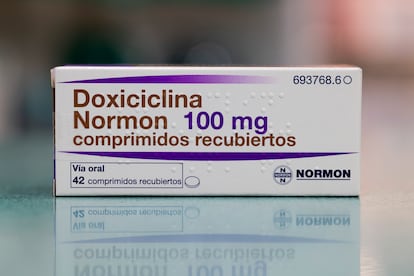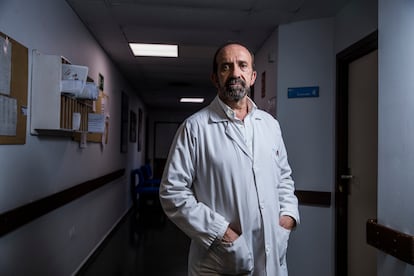A medication that is more than 50 years old is the next great hope for halting the rise in syphilis and chlamydia
Taking a single dose of doxycycline within 72 hours following high-risk contact can eliminate more than 80% of cases of two of the most common sexually transmitted infections

Innovation through cutting-edge treatments is a priority goal among medical professionals when it comes to facing down great challenges in health. Sometimes, however, the solution to certain problems is already in the drawers of pharmacies, and scientific advances actually involve research into new uses for old medicine. This is known as drug repositioning, and so far, entails one of the best alternatives that researchers have found in battling one of international health authorities’ greatest concerns: an explosion in sexually transmitted infections (STIs), a global phenomenon that has become particularly serious in Europe.
“Doxycycline is an antibiotic that has been used for decades to cure many infections. Now, new research has found that a 200-milligram pill, used as prophylaxis during the 72 hours following high-risk sexual contact, reduces by nearly 80% one’s chances of contracting syphilis and chlamydia, two of the most common STIs. This innovation in use of the medication is a substantial advance, because it is the first time that a simple-to-apply pharmacological intervention has been indicated in the prevention of these infections, which are very common among some groups,” explains Santiago Moreno, head of the infectious diseases department at Madrid’s Ramón y Cajal Hospital.
Doxycycline Post-Exposure Prophylaxis, which is also known as “DoxyPEP,” has recently been a subject of much interest at scientific conferences related to STIs. This interest has been driven by a seemingly unstoppable growth in cases, a phenomenon that have sparked warnings from the World Health Organization (WHO) and the European Center for Disease Prevention and Control (ECDC). Syphilis cases in the EU, for example, grew by 34% in 2022 over the previous year, while in Spain, infection rates have increased tenfold — from 1.77 cases per 100,000 residents in 2000 to 17.10 in 2022 — according to a recent report by the Spanish Health Ministry.
María del Mar Vera, president of the study group on sexually transmitted infections at the Spanish Society of Infectious Diseases and Clinical Microbiology (GeITS-SEIMC), says that “this global increase has made it necessary to promote new preventive strategies and doxycycline offers very promising results.” However, the expert warns that, “the risk of developing resistance and the possible adverse effects of the continued use of the drug” are limitations that require “prudence” before widening the use of DoxyPEP.
Three of the SEIMC’s study groups — GeITS, the HIV/AIDS-focused GeSIDA and GEMARA, the latter of which is devoted to study of antimicrobial resistance — published “a position paper” last March that was reviewed by the Spanish Health Ministry. The paper collects available scientific evidence and includes recommendations. According to this text, “the prescription of DoxyPEP should only be assessed on an individual basis for MSM [men who have sex with men] or TGW [transgender women] who have sex with men and who have had repeated STIs in the last year.” The pill “should be taken as soon as possible after a sexual contact” of risk, “ideally within the first 24 hours, and never later than 72 hours,” the document continues.
The SEIMC groups also insist that while “STI prevention using DoxyPEP should not be carried out at the expense of established preventive measures, meaning that it is fundamental to inform the patient about the importance and necessity of using protection while having sexual relations.”
In 2018, French researchers published the first large-scale study on DoxyPEP in preventing STI. The 10-month study followed 232 participants — men who have sex with men and transgender women — who take PrEP, another medication that reduces the risk of contracting HIV when taking before high-risk sexual relations. PrEP has proven to be highly effective in preventing infections of HIV, but that success has had an undesirable side effect: among certain groups, the use of condoms has fallen, which has in turn contributed to the increase in other STIs, say the experts consulted for this article.

“Studies carried out in France and the United States show that DoxyPEP has manage to reduce the risk of contracting syphilis and chlamydia among PrEP users and people who live with HIV by 80% or more, compared with a placebo. In contrast, when it comes to gonorrhea, doxycycline has not been demonstrated to be significantly effective, which is surely due to resistance that gonococcus [the bacterium that causes it] has already developed,” says Moreno. Another study that was carried out in Kenya among women did not find any significant reduction in that group.
This evidence has opened up a debate over publicizing the use of DoxyPEP as a public health strategy. The three SEIMC groups advocate for using it on an individualized basis only when there are antecedents of past STI. “Despite having obtained promising results among men who have sex with men and transgender women, there are still many unknowns in regards to its impact on effects on both individuals (adverse effects and microbiome alteration) as well as the population (selection and dissemination of antimicrobial resistance),” the document states.
Still, some professionals consider that given the available information, further steps should be taken. “We’ve experienced a change in recent years when it comes to sexual relations and dynamics, which are today more open and free. This is a positive, but it has had an undesirable effect that we must address: an increase in STIs. The question is, how we can do that? Longstanding evidence suggests that relying on condoms as the only strategy doesn’t work. The benefit of DoxyPEP is so potent that we cannot fail to implement it,” says Jorge García, doctor at the STI unit of Barcelona’s Centro Drassanes-Vall d’Hebron, one of the leading hospitals in Catalonia.
This opinion, which is shared by Moreno, does not deny the risk of developing resistance, but considers it “a hypothesis” that should be monitored. “The results that are currently available do not indicate an increase in resistance, so it does not seem to be enough reason to limit access to DoxyPEP,” says García.
This debate — and the indecision regarding which recommendations to adopt — is also taking place on an international level. “There is certain disparity, but the vast majority of high-impact international agencies and scientific organizations advocate for restricting use of DoxyPEP to patients with repeated STIs and under medical assessment on a case-by-case basis. This is what the report from the three SEIMC study groups advocates,” says María del Mar Vera.
Julia del Amo Valero, director of the HIV, STI, viral hepatitis and tuberculosis control division of the Spanish Health Ministry, says that her department “has widely collaborated with the ECDC in reviewing scientific evidence to reach a consensus on a shared position regarding the possible widespread use of DoxyPEP in the prevention of syphilis and chlamydia.” The ministry has reviewed the report from the SEIMC, which has been “shared with the communities involved with the National Plan Against Antibiotic Resistance (PRAN) to work together in the approach to this new preventive strategy and its possible implications,” she says.
Doxycycline is a so-called tetracycline antimicrobial and has been on the market since the late 1960s. “They were one of the first groups of antibiotics to be discovered and have been used for more than half a century, so we know them well. They are indicated in the treatment of multiple infections, including some STIs, but also for respiratory and skin conditions,” says Pablo Caballero, who works in the area of scientific dissemination at Spain’s General Council of Official Pharmacists’ Associations.
There are about 15 presentations of this medication currently on the market, although nearly all of them come in 100 milligram doses and only one — Proderma 200mg, which is more commonly used for skin infections — is currently adjusted to the dose required for DoxyPEP. Doxycycline, despite being considered a drug without too many side effects, is clearly contraindicated “during pregnancy because it affects the formation of the bones of the fetus,” says Caballero. The drug should also not be used for this purpose by children under the age of eight, in whom it can cause permanent staining of the teeth, a side effect that was suffered by some people who were born in the 1960s and 1970s who received the antibiotic during childhood.
Sign up for our weekly newsletter to get more English-language news coverage from EL PAÍS USA Edition
Tu suscripción se está usando en otro dispositivo
¿Quieres añadir otro usuario a tu suscripción?
Si continúas leyendo en este dispositivo, no se podrá leer en el otro.
FlechaTu suscripción se está usando en otro dispositivo y solo puedes acceder a EL PAÍS desde un dispositivo a la vez.
Si quieres compartir tu cuenta, cambia tu suscripción a la modalidad Premium, así podrás añadir otro usuario. Cada uno accederá con su propia cuenta de email, lo que os permitirá personalizar vuestra experiencia en EL PAÍS.
¿Tienes una suscripción de empresa? Accede aquí para contratar más cuentas.
En el caso de no saber quién está usando tu cuenta, te recomendamos cambiar tu contraseña aquí.
Si decides continuar compartiendo tu cuenta, este mensaje se mostrará en tu dispositivo y en el de la otra persona que está usando tu cuenta de forma indefinida, afectando a tu experiencia de lectura. Puedes consultar aquí los términos y condiciones de la suscripción digital.









































